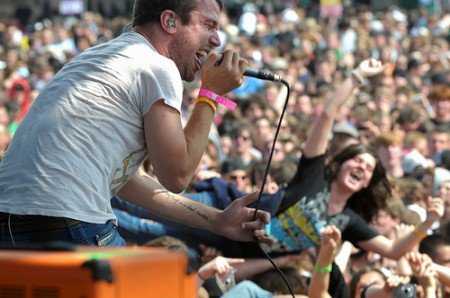Bit of a stink going on at the moment.
There’s probably a not inconsiderable queue stretching out of your local garage forecourt after to David Cameron’s gentle nudge in the direction of a Jerry can led to the nation rushing out to petrol stations up and down the land to avert the disaster of a possible walk to work. If you’re over the age of 65 or partial to a Greggs pasty, you might not be too happy either.
If you’re still on over 40 fags a day and enjoy the odd can of cheap supermarket beer, well, it doesn’t bare thinking about…
But in these times of economic cutbacks left, right and centre, should we also be sparing a thought for the poor, over-worked festival organiser? Today, the Sonisphere festival became the latest event to pull out of this summer’s UK season despite having Brian May, Roger Taylor and some fella who used to be on American Idol booked as their headliners.
Oh the humanity!
“Putting the festival together in what is proving to be a very challenging year was more difficult than we anticipated and we have spent the last few months fighting hard to keep Sonisphere in the calendar,” a statement read. “Unfortunately circumstances have dictated that we would be unable to run the festival to a standard that both the artists and that Sonisphere’s audience would rightly expect.”
Unfortunately, this is hardly out of the blue. Instead, it’s the continuation of a now familiar, growing trend. Just before Christmas last year Oxegen delivered its own seasonal message by announcing a break for 2012, joining a similar plan by the daddy of them all, Glastonbury, which will also not be a part of the UK festival extravaganza this year.
While Glastonbury might have negotiated the choppy waters of its own crisis in 2008 safely, its supremo Michael Eavis told The Times last July he is no longer confident enough to think beyond the next three or four years. “Partly it’s economics, but there is a feeling that that people have seen it all before,” he said. “We’ve probably got another three or four years. Womad and Latitude are not selling out. We sell out only because we get huge headliners. In the year Jay-Z played we nearly went bankrupt.”
If even Glastonbury is watching its back, you know there’s trouble brewing.
It would appear to be a problem on most organisers’ minds. John Giddings, the man who brought the Isle Of Wight festival back in 2002 and has since seen it grow into one of the most popular on the calendar, pointed the finger of blame at the over-crowded market after around 30 UK festivals were reported to have been pulled by August 2011. “There are just too many events now in the UK and it’s impossible for them all to survive, the market is saturated,” he told the BBC. “I don’t think there will be a big casualty, I think there will be smaller ones. I think it’s like a culling affect at a lower level.”
The reality of boom and bust economics, which for years we’d been assured was a thing of the past, is hitting people hard. While house prices, wages, job prospects and much else soared during the early part of the last decade, so did the festivals. More and more appeared on the horizon, gladly reaping the benefits of a youthful population with plenty of spare change in their pockets, offering a seemingly endless amount of choice as each summer came and went with new events being added to the calendar. Prices continued to rise. Numbers, but not camping space, grew and grew. Everyone was enjoying the party, and the profits. Evidently though, the tent wasn’t fixed while the sun was shining.
Now, like the petrol gages in the cars of those panic-stricken drivers, things have reached a tipping point. The YouGov Sixth Sense Music Festival Report, released last month, discovered half of those who took part in its survey did not expect to attend a festival this year after having visited an event in 2011. In addition, one third of the adults polled suggested festivals have become too expensive, while only a tiny five per cent believed them to provide value for money.
Regardless of where you believe the reasons, and blame, for all this should be laid, almost every aspect of people’s lives are being affected by cuts, and it’s high time festivals took a reality check. Priorities have shifted, and the major events of the UK summer season need to change with them. Melvyn Benn, chief of the Reading / Leeds twin carnivals, has tried to make a start. “Money is tough, up and down the country, particularly for the Reading and Leeds audience, young people,” Benn told BBC 6Music. “So somehow and I genuinely haven’t worked out how I am going to do it, I’ve got this thing – and I am committing to it – that for each of the music days every weekend ticket holder will get a free beer and burger as part of their ticket price. I have no idea how I am going to make it work.”
It’s unlikely to make much of a difference in the face of ticket and goods prices, but it is a small sign of the turning tide nonetheless. There’s more good news for smaller UK festivals as well. Despite John Giddings’ comments lower key events, many of which offer a variety of entertainment at more reasonable prices (such as Hop Farm, Live From Jodrell Bank, and the biggest success story of them all, Bestival), are going from strength to strength, showing the problem for the majors might not just be a change of income, but a change of attitude as well.
The bottom line is, a large chunk of £200 for a weekend of weak beer and rough nights within elbowing distance of your neighbours is no longer being seen by enough people as the most preferable way of parting with their hard earned cash, and it’s going to take more than a free pint and burger to change their minds.
There’s hot Greggs pasties at stake here after all.





Nice article. I have though for years that the Mega fests such as Glastonbury, sonisphere were getting too bloated in both the event and prices. The smaller festivals this year are replacing the mandatory holiday abroad for many families. It looks like a bit of a revolution for the smaller fests this year.